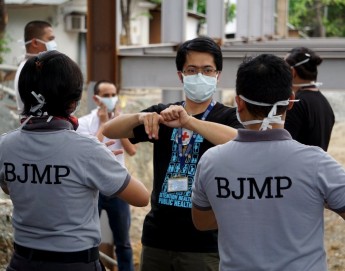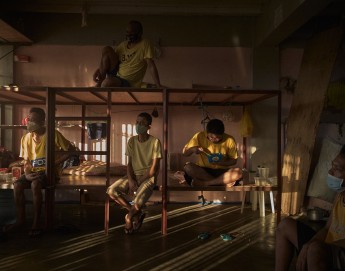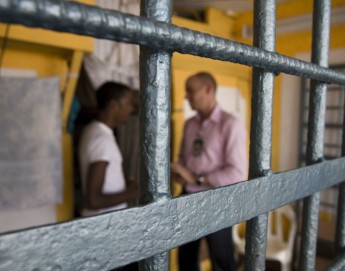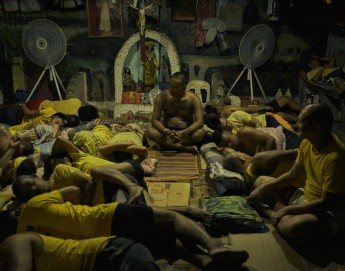
Malaysia: Swift action by authorities reduces COVID-19 risk in prisons

Kuala Lumpur – Taking swift action to protect prison populations from exposure to novel coronavirus disease (COVID-19), the Malaysian authorities have stopped pronouncing custodial sentences as punishment for violation of the Movement Control Order (MCO). This comes in response to an appeal made last week by Prisons Department director-general Datuk Seri Zulkifli Omar to stop jailing violators of MCO as their admission into the country's prisons could trigger a COVID-19 outbreak inside.
Commending the decision, the head of the International Committee of the Red Cross' (ICRC) regional delegation in Kuala Lumpur, Biljana Milosevic, said the move is aligned with the organization's global position on the issue of overcrowding in places of detention and the added risk of infection already faced by detainees. The ICRC observed that sending more people to prison would be counterproductive to the very intent of the MCO, which is to stop the spread of COVID-19 in the country.
Working proactively to contain the spread of the pandemic inside places of detention, the Malaysian authorities are taking measures such as screening temperature of new arrivals, health checks for prison staff, sanitization work and setting up isolation blocks and quarantine centres in addition to suspending external visits. With these crucial measures in place, no case of infection has been reported yet in any place of detention across the country.
Milosevic emphasized the importance of continued and consistent action to ensure this remains the case for as long as feasibly possible. The regional delegation has been working closely with all authorities concerned to ensure their capacity and preparedness in both preventing an infection from occurring and responding with adequate resources in case of an outbreak.
We have donated personal protective equipment like masks and hygiene items such as soaps and hand sanitizers for staff and detainees in all prisons, immigration detention centres and temporary detention centres in the country (see infographic). In addition, thermometers have also been distributed for thorough screening of new detainees and staff, which should lead to the isolation of those with symptoms. We know from experience that continuous access to soap, clean water and other hygiene materials can prevent the spread of disease inside these facilities.
The ICRC has also provided technical advice through Health Care in Detention guidelines on COVID-19, which have been adapted to Malaysia's context with instructions from the Ministry of Health. While the health care and safety of detainees are of primary concern, it is also very important that detainees and their family members remain in contact with each other through various means of communication while visitations are suspended.
In addition, we strongly believe that reducing the number of people in places of detention could help reduce the risk of a COVID-19 outbreak. In some contexts, recommendations are being considered for the release of vulnerable detainees to take some pressure off detention health-care systems. One example is the neighbouring country Indonesia, where detaining authorities released around 22,000 inmates from its penitentiary systems last week to reduce the risk of transmission in its facilities.

The reality remains that the coronavirus causing COVID-19 spreads easily. The rate of transmission inside places of detention will be higher due to the conditions including close proximity among detainees that makes physical distancing impossible. Worsening the impact are other realities such as the health conditions of the detainees. Often, people in places of detention come from vulnerable socio-economic backgrounds with limited access to health care and nutrition. They may also already have compromised immune systems because of tuberculosis or HIV/AIDS or other pre-existing chronic conditions like diabetes.
Given these conditions, even a single case of infection could prove devastating to the entire population in detention. Containment could also prove challenging as places of detention are not completely walled off from society. Although external visits have been suspended as a preventative measure, there remains a constant flow of staff to and from the facilities, which also means regular contact with the general public.
Based on our work related to conditions of detention and advocating for non-custodial measures and alternatives to deprivation of liberty, we have presented various options to the States, judiciaries, prosecutors and detaining authorities, to help them think through and balance the many complicated factors involved in such decisions. We are prepared to offer further support and our expertise in infection protection and control while preserving the fundamental rights and dignity of detainees to the Prisons and Immigration Departments of Malaysia, the Ministry of Health and other parties concerned.
The COVID-19 pandemic is a global fight that requires a global response. This unseen enemy does not discriminate, it demands in no uncertain terms prompt, unified and unequivocal action by all. It is a threat to us all, to our public health systems, all sectors of the global economy and to human lives, regardless of where we are in the world. The ICRC believes this is a fight we must wage together and a fight we have to win.
To view the infographic in high resolution, click here.




